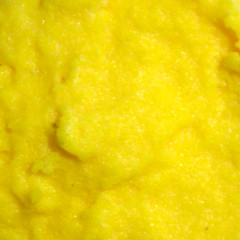Serious question
Just when I was thinking two carnivals in a week would suffice for a lifetime, a third came long. And a fourth beckons.

Menton is a fine resort situated just after Monaco ends, going east along the Riviera, but before Italy starts.

Why the words - "shall we go to the La Fête du Citron ?" - even occurred to me, let alone escaped from my lips, I cannot tell.

One answer could be that it gave an excuse for another trip along the coast by rail, this time straying eastwards beyond Nice.

I mustn't prattle on about the joys of taking a train journey on the French Riviera; just do it if you find yourself in the area.

Nor should I attempt to describe La Fête du Citron at undue length. It's not so different from the carnivals of mimosas or whatever, and even the colour wouldn't change much if it were not for the similar abundance of oranges.

So getting back to the subject I identified in my headline, what exactly is the point of polenta?
It was served with stewed beef as part of an agreeable enough meal at Le Majestic, a brasserie located between the station at Menton and the ticket office where they charged you 14 euros a head to proceed to the promenade and find somewhere to stand and watch the parade.
For the last daytime procession of the carnival, Le Majestic was taking no chances and offered a single set menu - the beef, preceded by an excellent rough pate with, fittingly, lemon tart to finish and a little jug of wine thrown in - for 21 euros.
The ambiance was jolly, helped along by two bibulous couples on a coach trip from Sancerre - "what name do you give your husband's private parts?" one of the messieurs asked at one point.
But no one could quite work out why the beef had to be accompanied by polenta, except that we were so close to Italy.
It just seemed to be slab of nothing, edible but desperately uninteresting and devoid of taste unless you smothered it in the sauce from the meat.
That blogging standby Wikipedia describes it thus:
Many new recipes have given new life to an item which is, in essence, a fairly bland and common food, invigorating it with various cheeses or tomato sauces.
But giving something that has no taste "new life" by adding cheese or tomato is surely like making the phone book sound great by getting a wonderful singer to warble extracts from J or K. Or have I missed something?


The last of my carnivals is this Sunday and the good news is that it's in Le Lavandou. I'll eat at home.
Labels: carnivals, citron, France, Italy, Le Lavandou, lemon. oranges, Menton, Nice, polenta, Riviera, train


27 Comments:
I've always wondered what happens to all those oranges and lemons...it seems such a waste to me. Do they make gigantic vats of marmelade and lemon curd after the festival or what?
As for the polenta, I quite agree with you. Completely tasteless. About as tasteless as tofu.
It's like with the flowers at a corso - people grab what they can from the floats as their bonus for attending. At least, that's what happened at Bormes-les-Mimosas and I saw a few people in Menton with bags of lemons and oranges.
Here she comes again, disagreeing! There is polenta and polenta!
I've made it at home and as you say, not worth the effort. I have eaten it here (we are only 40km from the Italian border so quite a strong Italian influence in the cooking) and it is very good - for polenta, that is!
Polenta, cooked properly, can be a very wonderful thing. You need to look a little harder. Meanwhile, just be thankful you had a carnival to attend. The polenta is indigestible? Then have more wine.
I never understood why it became trendy to eat polenta. It's an utterly bland staple. I've eaten it once or twice because it was on my plate but I'd never actually choose to eat it. It's like mozzarella really. It's just there.
Aha - mozzarella. I used to think that it was bland but I've come to appreciate the subtle flavour and often make a tomato and mozzarella salad.
Perhaps I'd better persevere with polenta in that case :-)
Again, it's got to be a really good, fresh, well-made mozzarella, otherwise you might as well just get something generic in a plastic bag from the frozen-food section of your supermarket. Polenta, made with care, can be very subtle and also versatile.
...and it must be made with buffalo milk!
I was going to give all you non-polenta lovers the recipe for polenta from Elizabeth David's book 'Italian Cuisine' but have hunted high and low and can't find it. Will post it when the book turns up (I suspect my daughter has 'borrowed' it!).
I don't have too much time for polenta, though admittedly you don't get too many opportunities to try it in Orléans.When visiting Italy I have always focused on the antipasti and pasta.
Nevertheless it's a definite step up on dumplings.
How do you milk a buffalo?
This comment has been removed by the author.
The same way you milk a cow.
My guess is you have to be much more careful with a buffalo!
Roger!!! Honestly! And I see you even managed to post the question twice!
So let's see if you have learnt anything today! How do you milk a horse? Think carefully before replying!
You see, that’s why I love Colin’s blog. The way it can cover highbrow topics of politics, law, culture and yet still leave room for low life Anglo-Saxon liberals like me.
Oh, and by the way, I didn’t post the question twice; ‘onest. It was the computer what dunnit!
Is it true that low life Anglo Saxon liberals know nothing about tweaking tits?
It must be. I can't be the only example.
I notice no one's tackling Louise's question about milking a horse. And it must be possible -- Mongolians drinked fermented mare's milk. But buffalo are quite amiable beasts, Roger. Incidentally, do you know the difference between a buffalo and a bison?
Bill, from where did you dredge up 'drinked'? Is that one step beyond drunk? Was it 6 or 60 drinks?
That's a good question, Richard! I just wish I had a good answer. I have no idea where that one came from but I am suitable chastened. And, alas, sone cold stober!
This comment has been removed by the author.
I just googled "how to milk a horse" (because I don't get out much and this is quite exciting compared to the rest of my life) and I came across this site:
Now - is this a joke? I mean with headings such as "Know your teats" I'm sure it must be slightly tongue in cheek. But what about the section on cat's milk? That is a joke, isn't it?
I'm getting a bit stupid in my old age.
The hardest part about milking a cat is getting the bucket under.
This comment has been removed by the author.
Tell us, Bill, did you manage to say cantankerousness correctly after having drinked six drinks?
Ouch! I'm never gonna live that one down, am I? And I don't remember if I could say cantankerousness or not by the end of the evening.
Post a Comment
<< Home